Where are they now?
In June, we will celebrate the graduation of the sixth cohort of International Development (INDEV) students. We thought it would be great to check in with alumni from each of the previous five cohorts to see what they are up to.
Sheila Ball (class of 2012):
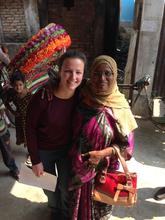 "After finishing my BES, I did an MSc in Hydro-Informatics and Water Management ('14). I then worked briefly in Ottawa before moving to the Netherlands to work for Deltares. Deltares is an independent institute for applied research in the field of water and subsurface. I work in the areas of groundwater quantity and quality modelling, as well as integrated water resources management, and get to work on both consulting and research projects.
"After finishing my BES, I did an MSc in Hydro-Informatics and Water Management ('14). I then worked briefly in Ottawa before moving to the Netherlands to work for Deltares. Deltares is an independent institute for applied research in the field of water and subsurface. I work in the areas of groundwater quantity and quality modelling, as well as integrated water resources management, and get to work on both consulting and research projects.
In the Netherlands, we've developed a free smartphone app to allow people to quickly and easily take nitrate measurements, and then share them via a web platform. I'm also involved in a number of international projects, and thrilled to be combining my knowledge and experience from both my studies in international development and water resources management.
I'm currently leading a project in Bangladesh called "Innovative monitoring and reporting for sustainable water quality of the Meghna River (ISWAM)," where we're working with local river watchdog committees to gather water quality data using a smartphone app. This data is being imported into a system that will provide the Department of Environment with more water quality data to facilitate their regulatory enforcement process. I also just returned from a business trip to Colombia, where we are modelling the Cauca Valley in partnership with the local water and environmental authority. The tools that we are building are helping them with their water management decisions, especially during dry (El Nino) years to decide how to optimize surface water and groundwater use.
If anyone wants to get in touch with me to find out more about the work that I do, or talk about project opportunities (including measuring nitrate), they can email me here: sheila.ball@deltares.nl "
Kevin McGregor (class of 2013):
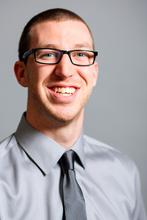 Kevin received a St. Paul’s Young Alumni award in 2015 in recognition of his work in international development and with First Nations youth in Northern Ontario and Manitoba.
Kevin received a St. Paul’s Young Alumni award in 2015 in recognition of his work in international development and with First Nations youth in Northern Ontario and Manitoba.
He has held manager and director roles in operations and fundraising with Right To Play Canada and Canadian Feed the Children, and his work includes a strong focus on delivering programs for children in Western/Eastern Africa, South East Asia, South America, as well as Cree, Ojibway and Mi’kmaq nations in Canada.
“With a steadfast commitment in supporting marginalized or disadvantaged communities as an ally, I am looking to bridge the gap between research and practice in building resiliency for children, families, communities, and nations. My interest lies specifically in supporting children and young people affected by adverse childhood events.”
Earlier this year Kevin launched Collective Future Consulting and is working with an international children’s charity to develop programs for migrant and refugee children and youth in detention centres in Thailand.
Graeme Reed (class of 2014)
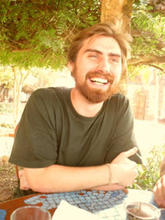 "I work as a Senior Policy Analyst at the Assembly of First Nations in Ottawa, where I lead the policy development, coordination, and analysis work related to climate change, environmental assessment, energy development, and anything else that comes by my desk.
"I work as a Senior Policy Analyst at the Assembly of First Nations in Ottawa, where I lead the policy development, coordination, and analysis work related to climate change, environmental assessment, energy development, and anything else that comes by my desk.
I completed my field placement in Senegal and it taught me to be adaptable, creative, and genuine. The INDEV degree gave me a unique appreciation of the complexity of challenges within our current social, legal, cultural, political, and environmental systems. INDEV helped me understand that systems-based approaches are required to solve those challenges.
For my graduate thesis, I returned to Senegal to conduct research with some of the farmer cooperatives and organizations that I worked with during my placement. It was really inspiring being able to revisit people, learn more from them and share the lessons that they taught me with others."
We asked what advice he would give to future INDEV students:
“Listen, stay inspired, and approach every problem with humbleness, generosity, and love. For me, INDEV offered a unique community of open-minded, dynamic, thoughtful, and kind individuals that became family by the end of the four years. Don’t hesitate to reach out to me or any other alumni if you have any questions.”
Jon Self (class of 2015):
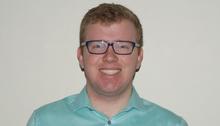 "For the last year, I have been working with World Renew, an international development and disaster response organization based in Burlington. I am responsible for coordinating communications strategies for projects that respond to natural disasters and conflicts in 20 countries, including Syria, South Sudan, Haiti and Nepal. I have played a key role in communications efforts that have fundraised over $2 million.
"For the last year, I have been working with World Renew, an international development and disaster response organization based in Burlington. I am responsible for coordinating communications strategies for projects that respond to natural disasters and conflicts in 20 countries, including Syria, South Sudan, Haiti and Nepal. I have played a key role in communications efforts that have fundraised over $2 million.
Most importantly, I think, my INDEV degree taught me to remember the stories of people living in poverty, and not to minimize their humanity. Their stories need to be told, and my work with World Renew is providing me with a unique opportunity to do so. I get to talk firsthand with families who lost everything when Hurricane Matthew battered their community in Haiti, or to hear from co-workers the stories of those living through atrocities in Aleppo.
Yet there are also amazing stories of hope, like a family in South Sudan helpig their neighbours when they themselves have very little. These are people - just like you and me - and it is a great privilege to share both the heartbreaking and inspirational stories with Canadians."
And now, the class of 2017
On April 28, 23 students in the INDEV class of 2017 made short presentations about their work experiences with development and environmental organizations in Botswana, Ghana, Malawi, Nepal, Sri Lanka and Tanzania.
This year, placement themes included: sustainable tourism (Botswana, Tanzania and post-conflict Sri Lanka); business and youth (Malawi), fair trade marketing (Nepal), citizen-led watershed protection (Ghana), and farmer-led initiatives for sustainable livelihoods (Tanzania).
The presentations provided the audience with a glimpse of what life is like in some of the world’s most challenged developing countries and a glimpse of the work that is being done to promote sustainable development.
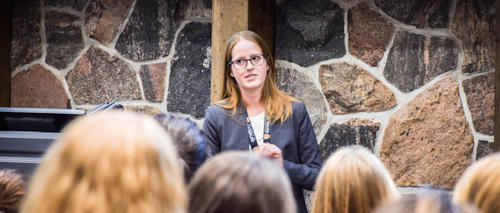 Sarah Wilkinson completed her placement with A Rocha Ghana, a leading environmental group with a specific focus on the Save Atewa Forest Campaign. During her capstone presentation, she tackled the complex issues of promoting sustainable tourism based on culture and heritage.
Sarah Wilkinson completed her placement with A Rocha Ghana, a leading environmental group with a specific focus on the Save Atewa Forest Campaign. During her capstone presentation, she tackled the complex issues of promoting sustainable tourism based on culture and heritage.
The examples Sarah gave were of the castles, forts and colonial buildings on Ghana’s Atlantic coast that once featured prominently in the African slave trade, but now feature prominently in the Ghanaian government’s tourism marketing. Ghana was the second-largest exporter of slaves and architecturally impressive buildings such as Cape Coast and St. George’s Castle housed many thousands of slaves in terrible conditions prior to being shipped to Europe and the Americas.
Sarah raised several difficult questions about the promotion of those historic sites as museums and tourist attractions. Who do the heritage sites belong to? Whose history is being told? Who should make money from this form of tourism?
For her placement, Alana Westervelt supported community-based cultural tourism operators with the Tanzania Tourist Board in Arusha, Tanzania. She brought up her experience of sitting under an old tree with a village chief, who showed her the branch where his grandfather was hanged in 1900 for refusing to follow German colonial imposition. A road project threatens to cut down the tree, and the villagers are not in favour. “The chief said: ‘They never even asked us if we wanted a road. It’s not just a tree; it’s our history, and we want to be able to make decisions about things that affect us.'"
Alana said, “The struggle is not over a tree. It is over memory. It is over history. It is over development and competing interests. There is a battle over who gets to decide when development (in this case, infrastructure) is more important than cultural and historical preservation.” She added that “conflicting interests arise in all stages and facets of development practice,” noting that here, one sustainable development goal is to safeguard the world’s cultural and natural heritage, while another is to build resilient infrastructure. “Who gets to decide the interests that are pursued? Do the people most affected get a say? In many ways, this tree sums up much of the work I was able to do in Tanzania, and in many ways, how I view development.”
She added that in Tanzania, local communities use cultural tourism as a platform by which they can tangibly illustrate to the government the importance of preserving culture and history. “I will admit, going into this placement, I was sceptical of cultural tourism and the positive effects it could have on local communities.” However, in speaking with coordinators and others in the industry, she now thinks the benefits can, at times, outweigh the potential negative impacts.
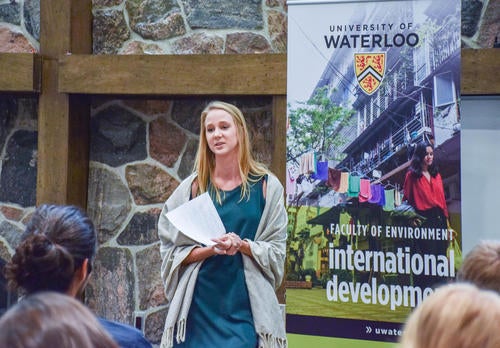
“I still struggle with the fact that outsiders (eg., tourists) need to identify something as valuable in order for it to be seen as worthy of preservation by the government, but community members often see it more as an opportunity.”
Alana was also this year's winner of the Alex Foto award, which recognizes the humanitarian spirit of a St. Paul's student who passed away suddenly in 2014.






